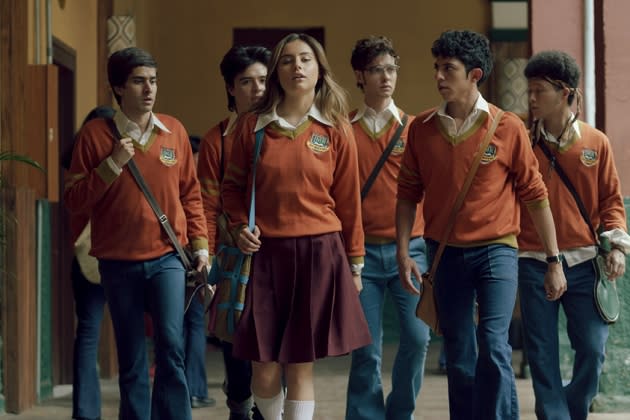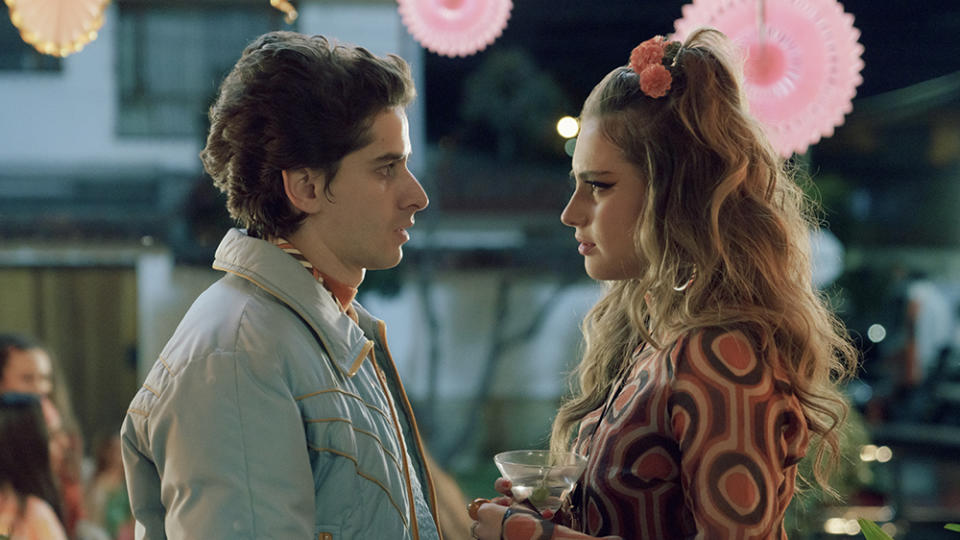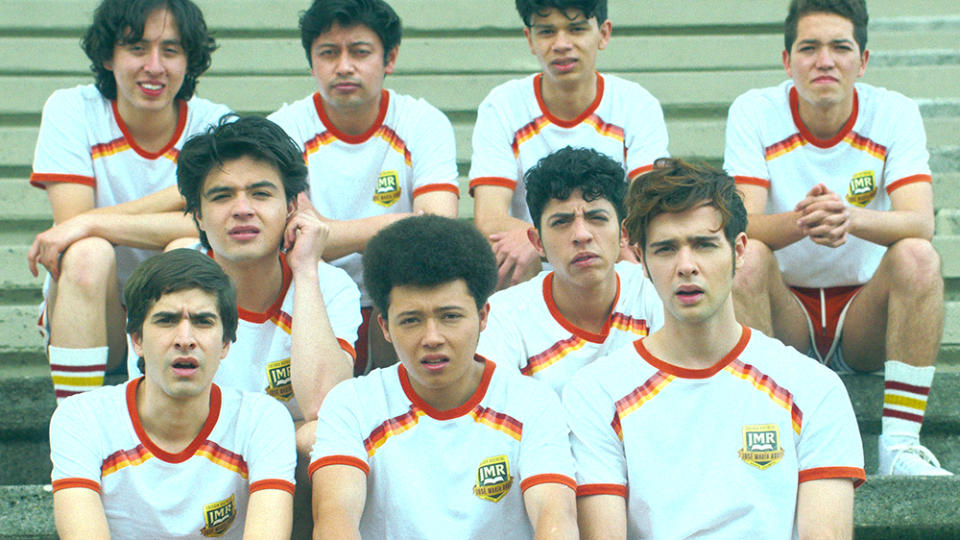Netflix Colombia’s ‘Eva Lasting’ Renewed, Broken Down by Caracol’s Dago Garcia, Streamer’s Carolina Leconte

Bowing Feb. 15 on Netflix, “Eva Lasting” hit its Top 10 in 14 countries across much of Latin America, scoring a global Top 10 berth, and now prompting the platform to order a second season just days after its release.
A high-end Caracol TV production that puts on full display the benefits of streamer backing, the sleek 13-episode show, directed by Mateo Stivelberg and Maria Gamboa, taps into the comforts that Latin American telenovelas have accustomed their audiences to while finding solid and sometimes new narrative ground in its runtime.
More from Variety
'Grand Crew' Creator and Cast on the 'Black Joy' of Season 2 and 'Feeling Drunk' On Set
Netflix Orders 'Mole Agent' Series Adaptation Starring Ted Danson From Mike Schur
Set at a 1976 Bogotá against the background of Colombia’s rampant modernization, the story follows Camilo (Emmanuel Restrepo) and his group of friends in a public boys school whose lives are irreparably changed when Eva (Francisca Estévez) becomes its first female student. Keenly aware of the tropes invoked down the decades by this kind of premise, the showplaces with them while giving color and depth to its characters. Eva rapidly escapes the ‘manic pixie dream girl’ archetype to become a full-fledged character whose actions are the catalyst for the evolution of the main characters.
Written by one of Colombia’s most prominent film-TV figures, writer-producer Dago García (“The Ride,” “Memories of My Father”) the series embraces its melodrama beats but give them a fresh dynamism and modern-day gender vibe, repackaging the telenovela, allowing an entry point for younger audience whose maturity allows for a more acid revisionism.
Variety talked with García and Carolina Leconte, Netflix Latin America content director.
Countries like Brazil and Turkey have made over their melodramas , creating series that work worldwide, made with an international standards technical prowess. How does Colombia rate in this rapidly changing landscape?
Carolina Leconte: I have the good fortune to say “very well.” Netflix allows us to try other types of narratives, widening the spectrum. That means looking for another type of content, addressing other types of issues and having access to all the tools at our disposal to venture into new grounds. It’s a matter of technical capacity, with a higher production levels.
Dago García: What’s happened with Brazil and Turkey has always been at the grasp of Spanish content. Thanks to the streamers, Latin American content has become universal. There are many cases of Latin American or Colombian products made with these audiences in mind but which have acquired a global dimension, thanks to the streamers. Through this new form of television, the world is discovering melodrama as a narrative paradigm that has an impressive universality. Turkey, Korea and Brazil have already worked on this But now many other cultures, including North Americans, have leaned into a melodrama mode which has very Latin American roots. Of course it is not a Latin American genre, it is a universal one, but the world has known it in its telenovela form.
Mateo and Maria are both relatively young filmmakers who, along with most of the cast, are taking their first steps in the industry. What is your take on these emerging talents and what do they represent for giants like Netflix?
Leconte: For Netflix it’s essential to gather together the best talents, we thrive on the contributions of very young and talented people such as Mateo and María. To us a narrative gains weight through the different visions that build it. It’s no mystery that one of the most coveted talents are writers because only a great idea, a great story will make the cut. But there is a gradual construction of a huge group of people, where everyone contributes. One of the assets of the show is having a lot of young talents who have big potential and that until now haven’t had that much screen presence. It’s vital to give spaces to these new talents because they will represent the growing industry that is starting to shine in Latin America.

The show’s strongest asset is finding a hybrid format between the series and the telenovela, relying on the strengths of both formats. Could you comment?
Leconte: That’s one of the most exciting things. We are suddenly able to access more types of melodramas, but the exercise of “Eva Lasting”, was to make content that is very much ours and yet tackles universal problems. It explores melodramatic conflicts but it speaks through a much closer narrative to who we are today. Framing it through the 70s, with the socio-political, cultural context allows us to access other subjects like philosophy or literature while tackling our modern topics. Stories can be told as long as one wants to stretch them. I think that this type of story takes advantage of melodramatic conflicts and gives a wonderful closure so that they are much more impactful.
García: At some point, a cannibal relationship between broadcast and streaming was at least glimpsed, but it turned into an interesting synthesis because both have influenced each other. Neither of the two has emerged unscathed, at least in Latin America’s case. Nowadays there’s no pure-play melodrama. It’s become a repository of many other types of content and has been influenced by them. With 200 episodes, telenovelas are the art of saying little over a long stretch of time. Now we are learning to condense them whilst the platforms have seen how melodrama brings a loyal audience. As a result, at least in Latin America, content has been transformed, achieving a synthesis in which both parties have won.
One might say we are living on a hinge of cultural transformation that has changed the tropes, archetypes and and narratives as to how we depict both the female and male. Your show is very much aware of this and modernized elements such as the “male gaze.” Could you comment?
García: Our objective was that despite the series taking place in a school context, it could not be exclusively about school. It centers on an important moment not only in the lives of the characters, but on that of a nation. Is both a coming of age and the transformation of a country. That’s why it’s told from the present. This is the story of a woman told by a man, of how she changed him, his group of his friends and changed that micro system that was the school. One single woman discovers the feminine and with it she broadens the panorama of all these characters, matures them. A story not only about the ‘70s, but about us, now. These comparisons are always very revealing, especially for today’s times.
Laconte: I was so excited when I saw that this was a story of an absolutely atypical woman. And I say atypical for the time, but what happens with Eva has always happened to women. What’s interesting is that although it is told through the viewpoint of a man, the story only unfolds through the actions of women. I say it in plural because it is not only Eva. One of the most important characters is Susana, for example, Camilo’s mother. She gives a completely different face to the show, addressing so many of the realities that a woman has to face. So it’s a vision of femininity. I am not saying that it is completely atypical, on the contrary, it’s very much what a woman goes through. An incredibly smart woman heightened through the eyes of an adolescent man who sees her as powerful, unattainable and huge. Imagine how rich! To turn around the archetypes of our melodramas and find female characters who are much more real, much closer to today’s audiences.

Best of Variety
From 'Daisy Jones & The Six' to 'Blonde': Books Made Into Movies and TV Series That You Should Read
Oscar Predictions: Documentary Short - Could ‘Stranger at the Gate’ Surprise on Oscar Night?
Sign up for Variety’s Newsletter. For the latest news, follow us on Facebook, Twitter, and Instagram.
